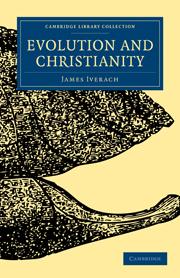Book contents
- Frontmatter
- Contents
- CHAPTER I EVOLUTION AND BEGINNINGS
- CHAPTER II EVOLUTION AND LAW
- CHAPTER III NATURE AND INTELLIGIBILITY
- CHAPTER IV THE STRIFE AGAINST PURPOSE
- CHAPTER V EVOLUTION AND CREATION
- CHAPTER VI ORGANIC EVOLUTION
- CHAPTER VII ORGANIC EVOLUTION (continued)
- CHAPTER VIII SUPER-ORGANIC EVOLUTION
- CHAPTER IX EVOLUTION AND PSYCHOLOGY
- CHAPTER X EVOLUTION AND ETHICS
- CHAPTER XI EVOLUTION AND RELIGION
CHAPTER VIII - SUPER-ORGANIC EVOLUTION
Published online by Cambridge University Press: 05 October 2010
- Frontmatter
- Contents
- CHAPTER I EVOLUTION AND BEGINNINGS
- CHAPTER II EVOLUTION AND LAW
- CHAPTER III NATURE AND INTELLIGIBILITY
- CHAPTER IV THE STRIFE AGAINST PURPOSE
- CHAPTER V EVOLUTION AND CREATION
- CHAPTER VI ORGANIC EVOLUTION
- CHAPTER VII ORGANIC EVOLUTION (continued)
- CHAPTER VIII SUPER-ORGANIC EVOLUTION
- CHAPTER IX EVOLUTION AND PSYCHOLOGY
- CHAPTER X EVOLUTION AND ETHICS
- CHAPTER XI EVOLUTION AND RELIGION
Summary
IT is with some timidity that one ventures at the present time to write the word “heredity.” It is one of the three great names which occur in connection with evolution. “Variability,” “natural selection,” transmission or “heredity,” are words which occur in every statement of the theory of evolution, and both the meaning and causes of each are keenly contested. At present the contest is keenly waged as to the nature and the meaning and the factors of heredity. The problem is, no doubt, a most complex one, and there are great biological authorities who widely differ as to what is transmitted and the means of transmission. Are acquired qualities—that is, qualities acquired in the lifetime of an individual—transmitted to his offspring? Weismann and Lankester deny the transmissibility of acquired qualities, and contend that only inborn, germinal, or constitutional variations are transmissible; while Mr. Herbert Spencer emphatically says that “either there has been inheritance of acquired characters, or there has been no evolution” (Contemporary Review, March 1893, p. 446). And again he says: “A right answer to the question whether acquired characters are or are not inherited underlies right beliefs, not only in biology and psychology, but also in education, ethics, and politics” (May 1893, p. 730).
- Type
- Chapter
- Information
- Evolution and Christianity , pp. 132 - 153Publisher: Cambridge University PressPrint publication year: 2009First published in: 1894



